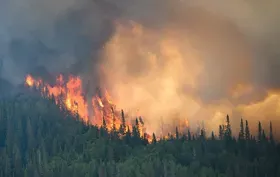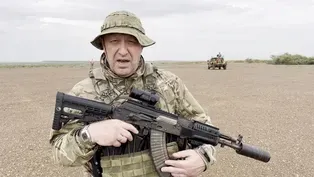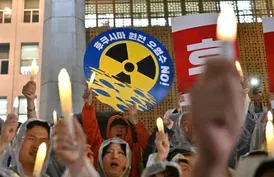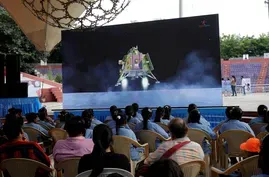
Northwest Syria faces slow recovery after earthquake
Clip: 8/23/2023 | 8m 38sVideo has Closed Captions
Northwest Syria faces slow recovery 6 months after devastating earthquake
In February, a 7.8-magnitude earthquake rocked northwest Syria, killing more than 7,000, injuring thousands more and destroying livelihoods. Cut off from the rest of the world by the Assad regime, survivors have struggled to rebuild. Special correspondent Leila Molana-Allen traveled to some of the worst-affected areas to speak with survivors coping with the emotional and physical scars.
Problems with Closed Captions? Closed Captioning Feedback
Problems with Closed Captions? Closed Captioning Feedback
Major corporate funding for the PBS News Hour is provided by BDO, BNSF, Consumer Cellular, American Cruise Lines, and Raymond James. Funding for the PBS NewsHour Weekend is provided by...

Northwest Syria faces slow recovery after earthquake
Clip: 8/23/2023 | 8m 38sVideo has Closed Captions
In February, a 7.8-magnitude earthquake rocked northwest Syria, killing more than 7,000, injuring thousands more and destroying livelihoods. Cut off from the rest of the world by the Assad regime, survivors have struggled to rebuild. Special correspondent Leila Molana-Allen traveled to some of the worst-affected areas to speak with survivors coping with the emotional and physical scars.
Problems with Closed Captions? Closed Captioning Feedback
How to Watch PBS News Hour
PBS News Hour is available to stream on pbs.org and the free PBS App, available on iPhone, Apple TV, Android TV, Android smartphones, Amazon Fire TV, Amazon Fire Tablet, Roku, Samsung Smart TV, and Vizio.
Providing Support for PBS.org
Learn Moreabout PBS online sponsorshipAMNA NAWAZ: In early February, a 7.8 magnitude earthquake rocked rebel-controlled Northwest Syria, killing more than 7,000 people, injuring thousands more, and destroying livelihoods.Cut off from the rest of the world by the Assad regime, survivors there have struggled to rebuild.
Earlier this month, special correspondent Leila Molana-Allen traveled to Idlib and Jindires, some of the worst-affected areas, to speak with survivors still coping with the emotional and physical scars left behind.
LEILA MOLANA-ALLEN: Another day, another pile of rubble.
In the months since February's devastating earthquake, Syrian communities in the rebel-held northwest of the country have slowly cleared the debris of countless destroyed homes from their streets, but little else has moved forward.
In the days following the quake, the world watched as, across the border in Turkey, international rescue teams flew in, working against the clock with high-tech machinery to save lives.
Here, no one came.
It's now extremely difficult for journalists to get into this part of Northwest Syria.
We have managed to get access for a rare visit.
But, as the attention of the international community moves away to other issues, human beings living here trapped in this crisis are increasingly being abandoned by the world.
Syrians trapped in this besieged enclave that's home to 4.5 million people were left to depend on the local civil defense volunteers known as the White Helmets, who've worked for years to save victims of airstrikes and shelling attacks carried out by Syrian dictator Bashar al-Assad and his Russian allies.
Facing such widespread destruction, with next to no equipment, many relied on little more than their hands; 4,500 people died here in the days following the earthquake.
Many of their lives could have been saved.
Maryam Khalil Sido's home collapsed in seconds when the earthquake hit.
She survived because she'd gone to the hospital.
But the rest of her family was still inside.
For three days, she could hear the voices of her children and husband calling for help from within the carcass of their shattered home.
But help never came.
Eventually, the voices stopped.
MARYAM KHALIL SIDO, Jindires Resident (through translator): I was hearing the sounds of my kids and couldn't help them.
I tried, but I couldn't.
To see my sons die in front of me, and I cannot save them, how do you feel if your son dies and you cannot save him?
LEILA MOLANA-ALLEN: Now Maryam, her daughter-in-law and granddaughter are living on the plastic tarpaulins amidst the dust and debris, using a former grain store for shelter from 115-degree heat.
They get by on food donated by surviving family and neighbors.
MARYAM KHALIL SIDO (through translator): I had many dreams, but my life was ruined.
Now I just want to find a home and leave this place.
LEILA MOLANA-ALLEN: Jindires was one of the area's worst affected by the earthquake.
And six months later, many of the buildings here are still in ruins.
People are living in tents on the rubble of their own homes.
It's so difficult to get building materials here because everything has to be bought from Turkey.
And even if they can manage that, most people here simply can't afford to rebuild.
With widespread reconstruction under way across the border in Turkey, locals say the price of building materials has nearly doubled due to demand.
The economy here was already struggling before the earthquake.
Most casual workers earned just a couple of dollars a day.
Many didn't just lose their homes when the earthquake struck, but their ability to bring in even that meager salary.
Mohammad Abdullah is a therapist for a mobile clinic in Idlib province.
Since the earthquake, they have spent each day going house to house to provide physical therapy for several hundred patients.
MOHAMMAD ABDULLAH, Physical Therapist (through translator): We go to houses of people to help them when their financial situation is not good or they can't travel.
We go to them and we give them therapy and give them tools like wheelchairs for their recovery.
LEILA MOLANA-ALLEN: The team does what they can.
But with thousands of people facing life-changing injuries here and limited resources, the need is overwhelming.
They're desperate for more funding and support to continue their work.
Bilal Summaq has seven children.
The oldest is just 12.
He used to work as a vegetable seller in his local market, earning enough to get by.
But as he rushed his children out of their crumbling tower block in the middle of the night, the stairs collapsed, crushing his leg.
He woke up in hospital to an amputated stump.
BILAL SUMMAQ, Amputee (through translator): What can I tell you?
I had my legs, so I could walk.
But now I have nothing.
I lost my leg.
And now my situation is very, very bad.
I used to stand in the street selling, but now I can't do anything anymore.
LEILA MOLANA-ALLEN: Like many of the injured, Bilal is in dire need of a prosthesis to get him on his feet again and extensive therapy to learn how to use it.
But that would cost hundreds of dollars for even the most basic model.
With their home destroyed and living on the charity of family and friends, affording one without help is unthinkable.
BILAL SUMMAQ (through translator): I just want to have my old life.
Now my situation is very, very bad.
Now the only thing I need is to have a prosthetic leg, so I can work and take care of my children and my wife, like I used to.
LEILA MOLANA-ALLEN: Bilal hopes one day he will be able to provide for his kids again.
But many more children have been left without a parent to even try.
This orphanage in Idlib City opened just a couple of months ago to try and offer some of them a new place to call home.
SUHAD BARAKAT, Karma Center For Orphaned Children (through translator): When the children first came to the center, they were so afraid.
Anything made them terrified.
It's a big responsibility.
We will try to do the best we can.
LEILA MOLANA-ALLEN: Stay strong.
Twelve-year-old Mohamad and his 11-year-old sister, Lina (ph), lost their entire family in the earthquakes when their home in Jindires collapsed.
MOHAMAD TAFRAN, Victim (through translator): We were sleeping, and the earth started shaking.
And we ran outside.
We went to my grandfather's house.
The White Helmets took us to my grandfather's house.
Then they told us that my father and my mother are dead.
Then the White Helmets took us to a camp, and we slept there.
And then the teachers brought us here.
LEILA MOLANA-ALLEN: Every child here has a similar story.
And there's only space for 100 children here.
Many hundreds more have been left without parents or a breadwinner to care for them, aged grandparents and distant family members doing what they can to support another mouth to feed.
And alongside the emotional devastation wrought by the earthquake, many children bear the physical scars too.
SONDOS SHAFIQ ABDO, Victim (through translator): This is my room.
LEILA MOLANA-ALLEN: Eight-year-old Sondos was buried under a mountain of bricks and mortar for 36 hours.
SONDOS SHAFIQ ABDO (through translator): That's my sister and that's me.
LEILA MOLANA-ALLEN: She was the only member of her family pulled out alive.
Her mother, father and twin sister were killed immediately.
Now her grandmother and grandfather hope they can make up for all she's lost.
FATIMA HOSSA, Grandmother (through translator): She was her father's favorite, so she needs someone to replace that father's kindness now.
LEILA MOLANA-ALLEN: Little Sondos' legs was smashed to pieces.
This kind of injury was so common during the earthquake, that it's become known as crush syndrome among doctors here.
The hospital thought they'd have to amputate, but several painful surgeries later, they have managed to piece her legs back together.
FATIMA HOSSA (through translator): She can walk, but not very well.
She has a difficult road ahead.
She needs someone to do everything for her, to dress her, to take her to the bathroom.
She needs help with everything.
God, give me the strength and long life to help.
LEILA MOLANA-ALLEN: Sondos' legs may be coming back to life, but her psychological wounds will be even more difficult to heal.
She rarely sleeps through the night, terrified her home will come crashing down around her again.
FATIMA HOSSA (through translator): In the night, she cries, "Earthquake, earthquake!"
She wakes up and starts screaming.
LEILA MOLANA-ALLEN: Back at the orphanage, the children gather excitedly to receive gifts of hope from a Syrian emergency task force sent by young people in the United States.
But for a generation of kids who've lost everything so early in their young lives, trapped in this embattled, forgotten corner of the world, hope may not be enough.
For the "PBS NewsHour," Leila Molana-Allen in Idlib, Syria.
Canada struggles to combat devastating wildfires
Video has Closed Captions
Clip: 8/23/2023 | 3m 2s | More than 37 million acres burned as Canada struggles to combat devastating wildfires (3m 2s)
How alleged death of Prigozhin impacts Russia's stability
Video has Closed Captions
Clip: 8/23/2023 | 9m 46s | How the suspected death of Prigozhin could impact Russia's stability (9m 46s)
A look at Japan's plan to release Fukushima's water into sea
Video has Closed Captions
Clip: 8/23/2023 | 8m 34s | A look at the plan to release Fukushima's treated radioactive water into the sea (8m 34s)
The significance of India's landing on the moon’s south pole
Video has Closed Captions
Clip: 8/23/2023 | 6m 15s | The significance of India's successful landing on the moon’s south pole (6m 15s)
What to expect as GOP candidates debate without Trump
Video has Closed Captions
Clip: 8/23/2023 | 5m 14s | What to expect as GOP presidential candidates debate without Trump (5m 14s)
Who will benefit from the new plan to relieve student debt
Video has Closed Captions
Clip: 8/23/2023 | 5m 59s | Who could benefit from the Biden administration's latest plan to relieve student debt (5m 59s)
Providing Support for PBS.org
Learn Moreabout PBS online sponsorshipSupport for PBS provided by:
Major corporate funding for the PBS News Hour is provided by BDO, BNSF, Consumer Cellular, American Cruise Lines, and Raymond James. Funding for the PBS NewsHour Weekend is provided by...

















